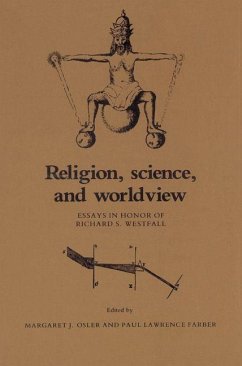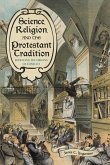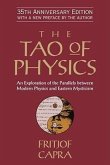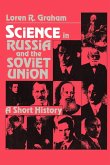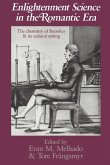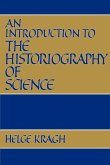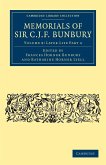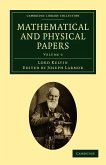J. Osler / Paul Lawrence Farber (eds.)Essays in Honor of Richard S. Westfall
Religion, Science, and Worldview
Essays in Honor of Richard S. Westfall
Herausgeber: Farber, Paul Lawrence; Osler, Margaret J.
J. Osler / Paul Lawrence Farber (eds.)Essays in Honor of Richard S. Westfall
Religion, Science, and Worldview
Essays in Honor of Richard S. Westfall
Herausgeber: Farber, Paul Lawrence; Osler, Margaret J.
- Broschiertes Buch
- Merkliste
- Auf die Merkliste
- Bewerten Bewerten
- Teilen
- Produkt teilen
- Produkterinnerung
- Produkterinnerung
Essays on Sir Isaac Newton; science and religion; and historiographical and social studies of science.
Andere Kunden interessierten sich auch für
![Science, Religion, and the Protestant Tradition Science, Religion, and the Protestant Tradition]() James C UngureanuScience, Religion, and the Protestant Tradition37,99 €
James C UngureanuScience, Religion, and the Protestant Tradition37,99 €![The Tao of Physics The Tao of Physics]() Fritjof CapraThe Tao of Physics17,99 €
Fritjof CapraThe Tao of Physics17,99 €![Science in Russia and the Soviet Union Science in Russia and the Soviet Union]() Loren R. GrahamScience in Russia and the Soviet Union35,99 €
Loren R. GrahamScience in Russia and the Soviet Union35,99 €![Enlightenment Science in the Romantic Era Enlightenment Science in the Romantic Era]() Evan M. Melhado / Tore Frdngsmyr (eds.)Enlightenment Science in the Romantic Era35,99 €
Evan M. Melhado / Tore Frdngsmyr (eds.)Enlightenment Science in the Romantic Era35,99 €![An Introduction to the Historiography of Science An Introduction to the Historiography of Science]() Helge KraghAn Introduction to the Historiography of Science48,99 €
Helge KraghAn Introduction to the Historiography of Science48,99 €![Memorials of Sir C. J. F. Bunbury, Bart - Volume 8 Memorials of Sir C. J. F. Bunbury, Bart - Volume 8]() Charles James Fox BunburyMemorials of Sir C. J. F. Bunbury, Bart - Volume 854,99 €
Charles James Fox BunburyMemorials of Sir C. J. F. Bunbury, Bart - Volume 854,99 €![Mathematical and Physical Papers - Volume 6 Mathematical and Physical Papers - Volume 6]() Lord KelvinMathematical and Physical Papers - Volume 644,99 €
Lord KelvinMathematical and Physical Papers - Volume 644,99 €-
-
-
Essays on Sir Isaac Newton; science and religion; and historiographical and social studies of science.
Produktdetails
- Produktdetails
- Verlag: Cambridge University Press
- Seitenzahl: 368
- Erscheinungstermin: 19. Juli 2002
- Englisch
- Abmessung: 229mm x 152mm x 22mm
- Gewicht: 597g
- ISBN-13: 9780521524933
- ISBN-10: 0521524938
- Artikelnr.: 21636018
- Herstellerkennzeichnung
- Libri GmbH
- Europaallee 1
- 36244 Bad Hersfeld
- gpsr@libri.de
- Verlag: Cambridge University Press
- Seitenzahl: 368
- Erscheinungstermin: 19. Juli 2002
- Englisch
- Abmessung: 229mm x 152mm x 22mm
- Gewicht: 597g
- ISBN-13: 9780521524933
- ISBN-10: 0521524938
- Artikelnr.: 21636018
- Herstellerkennzeichnung
- Libri GmbH
- Europaallee 1
- 36244 Bad Hersfeld
- gpsr@libri.de
List of illustrations; Preface; Acknowledgments; Part I. Newtonian Studies:
1. Conceptual problems in Newton's early chemistry: a preliminary study B.
J. T. Dobbs; 2. The significance of Newton's Principia for empiricism Ernan
McMullin; 3. The defective diagram as an analytical device in Newton's
Principia J. Bruce Brackenridge; 4. Force, electricity, and the powers of
living matter in Newton's mature philosophy of nature R. W. Home; 5.
Concepts of inertia: Newton to Kant Peter M. Harman; Part II. Science and
Religion: 6. Celestial perfection from the Middle Ages to the late
seventeenth century Edward Grant; 7. Baptizing Epicurean atomism: Pierre
Gassendi on the immortality of the soul Margaret J. Osler; 8. The
manifestation of occult qualities in the scientific revolution Ron Millen;
9. Piety and the defense of natural order: Swammerdam on generation Edward
G. Ruestow; Part III. Historiography and the Social Context of Science: 10.
What is the history of theories of perception the history of? Stephen M.
Straker; 11. Tycho Brahe as the dean of a Renaissance research institute
Victor E. Thoren; 12. Agricola and community: cognition and response to the
concept of coal James A. Ruffner; 13. Theories for the birds: an inquiry
into the significance of the theory of evolution for the history of
systematics Paul Lawrence Farber; Bibliography of Richard S. Westfall's
writings on the history of science; Index.
1. Conceptual problems in Newton's early chemistry: a preliminary study B.
J. T. Dobbs; 2. The significance of Newton's Principia for empiricism Ernan
McMullin; 3. The defective diagram as an analytical device in Newton's
Principia J. Bruce Brackenridge; 4. Force, electricity, and the powers of
living matter in Newton's mature philosophy of nature R. W. Home; 5.
Concepts of inertia: Newton to Kant Peter M. Harman; Part II. Science and
Religion: 6. Celestial perfection from the Middle Ages to the late
seventeenth century Edward Grant; 7. Baptizing Epicurean atomism: Pierre
Gassendi on the immortality of the soul Margaret J. Osler; 8. The
manifestation of occult qualities in the scientific revolution Ron Millen;
9. Piety and the defense of natural order: Swammerdam on generation Edward
G. Ruestow; Part III. Historiography and the Social Context of Science: 10.
What is the history of theories of perception the history of? Stephen M.
Straker; 11. Tycho Brahe as the dean of a Renaissance research institute
Victor E. Thoren; 12. Agricola and community: cognition and response to the
concept of coal James A. Ruffner; 13. Theories for the birds: an inquiry
into the significance of the theory of evolution for the history of
systematics Paul Lawrence Farber; Bibliography of Richard S. Westfall's
writings on the history of science; Index.
List of illustrations; Preface; Acknowledgments; Part I. Newtonian Studies:
1. Conceptual problems in Newton's early chemistry: a preliminary study B.
J. T. Dobbs; 2. The significance of Newton's Principia for empiricism Ernan
McMullin; 3. The defective diagram as an analytical device in Newton's
Principia J. Bruce Brackenridge; 4. Force, electricity, and the powers of
living matter in Newton's mature philosophy of nature R. W. Home; 5.
Concepts of inertia: Newton to Kant Peter M. Harman; Part II. Science and
Religion: 6. Celestial perfection from the Middle Ages to the late
seventeenth century Edward Grant; 7. Baptizing Epicurean atomism: Pierre
Gassendi on the immortality of the soul Margaret J. Osler; 8. The
manifestation of occult qualities in the scientific revolution Ron Millen;
9. Piety and the defense of natural order: Swammerdam on generation Edward
G. Ruestow; Part III. Historiography and the Social Context of Science: 10.
What is the history of theories of perception the history of? Stephen M.
Straker; 11. Tycho Brahe as the dean of a Renaissance research institute
Victor E. Thoren; 12. Agricola and community: cognition and response to the
concept of coal James A. Ruffner; 13. Theories for the birds: an inquiry
into the significance of the theory of evolution for the history of
systematics Paul Lawrence Farber; Bibliography of Richard S. Westfall's
writings on the history of science; Index.
1. Conceptual problems in Newton's early chemistry: a preliminary study B.
J. T. Dobbs; 2. The significance of Newton's Principia for empiricism Ernan
McMullin; 3. The defective diagram as an analytical device in Newton's
Principia J. Bruce Brackenridge; 4. Force, electricity, and the powers of
living matter in Newton's mature philosophy of nature R. W. Home; 5.
Concepts of inertia: Newton to Kant Peter M. Harman; Part II. Science and
Religion: 6. Celestial perfection from the Middle Ages to the late
seventeenth century Edward Grant; 7. Baptizing Epicurean atomism: Pierre
Gassendi on the immortality of the soul Margaret J. Osler; 8. The
manifestation of occult qualities in the scientific revolution Ron Millen;
9. Piety and the defense of natural order: Swammerdam on generation Edward
G. Ruestow; Part III. Historiography and the Social Context of Science: 10.
What is the history of theories of perception the history of? Stephen M.
Straker; 11. Tycho Brahe as the dean of a Renaissance research institute
Victor E. Thoren; 12. Agricola and community: cognition and response to the
concept of coal James A. Ruffner; 13. Theories for the birds: an inquiry
into the significance of the theory of evolution for the history of
systematics Paul Lawrence Farber; Bibliography of Richard S. Westfall's
writings on the history of science; Index.

